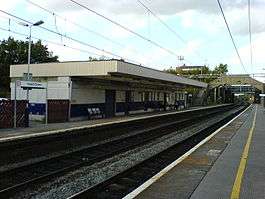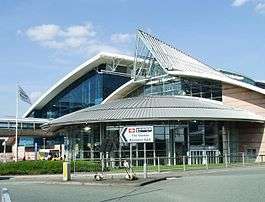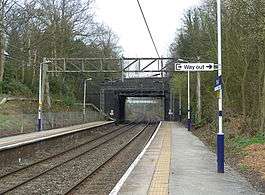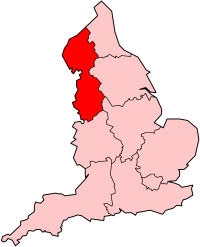Styal Line
The Styal Line is a suburban commuter railway line in the United Kingdom which runs through south Manchester and north-east Cheshire. It commences at Slade Lane Junction, about 2 kilometres (1.2 mi) south of Manchester Piccadilly, and runs 19 kilometres (12 mi) south to Wilmslow.
| Styal Line Airport Line | ||||||||||||||||||||||||||||||||||||||||||||||||||||||||||||||||||||||||||||||||||||||||||||||||||||||||||||||||||||||||||||||||||||||||
|---|---|---|---|---|---|---|---|---|---|---|---|---|---|---|---|---|---|---|---|---|---|---|---|---|---|---|---|---|---|---|---|---|---|---|---|---|---|---|---|---|---|---|---|---|---|---|---|---|---|---|---|---|---|---|---|---|---|---|---|---|---|---|---|---|---|---|---|---|---|---|---|---|---|---|---|---|---|---|---|---|---|---|---|---|---|---|---|---|---|---|---|---|---|---|---|---|---|---|---|---|---|---|---|---|---|---|---|---|---|---|---|---|---|---|---|---|---|---|---|---|---|---|---|---|---|---|---|---|---|---|---|---|---|---|---|---|
A Northern Rail train at Mauldeth Road in 2013 | ||||||||||||||||||||||||||||||||||||||||||||||||||||||||||||||||||||||||||||||||||||||||||||||||||||||||||||||||||||||||||||||||||||||||
| Overview | ||||||||||||||||||||||||||||||||||||||||||||||||||||||||||||||||||||||||||||||||||||||||||||||||||||||||||||||||||||||||||||||||||||||||
| System | National Rail | |||||||||||||||||||||||||||||||||||||||||||||||||||||||||||||||||||||||||||||||||||||||||||||||||||||||||||||||||||||||||||||||||||||||
| Status | Operational | |||||||||||||||||||||||||||||||||||||||||||||||||||||||||||||||||||||||||||||||||||||||||||||||||||||||||||||||||||||||||||||||||||||||
| Locale | Greater Manchester Cheshire North West England | |||||||||||||||||||||||||||||||||||||||||||||||||||||||||||||||||||||||||||||||||||||||||||||||||||||||||||||||||||||||||||||||||||||||
| Termini | Manchester Piccadilly Wilmslow | |||||||||||||||||||||||||||||||||||||||||||||||||||||||||||||||||||||||||||||||||||||||||||||||||||||||||||||||||||||||||||||||||||||||
| Stations | 9 | |||||||||||||||||||||||||||||||||||||||||||||||||||||||||||||||||||||||||||||||||||||||||||||||||||||||||||||||||||||||||||||||||||||||
| Ridership | 6.1 million per year | |||||||||||||||||||||||||||||||||||||||||||||||||||||||||||||||||||||||||||||||||||||||||||||||||||||||||||||||||||||||||||||||||||||||
| Operation | ||||||||||||||||||||||||||||||||||||||||||||||||||||||||||||||||||||||||||||||||||||||||||||||||||||||||||||||||||||||||||||||||||||||||
| Opened | 1909 | |||||||||||||||||||||||||||||||||||||||||||||||||||||||||||||||||||||||||||||||||||||||||||||||||||||||||||||||||||||||||||||||||||||||
| Owner | Network Rail | |||||||||||||||||||||||||||||||||||||||||||||||||||||||||||||||||||||||||||||||||||||||||||||||||||||||||||||||||||||||||||||||||||||||
| Rolling stock | Primarily: Class 319 (2015-) Class 323 (1993-) | |||||||||||||||||||||||||||||||||||||||||||||||||||||||||||||||||||||||||||||||||||||||||||||||||||||||||||||||||||||||||||||||||||||||
| Technical | ||||||||||||||||||||||||||||||||||||||||||||||||||||||||||||||||||||||||||||||||||||||||||||||||||||||||||||||||||||||||||||||||||||||||
| Track gauge | 1,435 mm (4 ft 8 1⁄2 in) standard gauge | |||||||||||||||||||||||||||||||||||||||||||||||||||||||||||||||||||||||||||||||||||||||||||||||||||||||||||||||||||||||||||||||||||||||
| Electrification | 25 kV AC overhead | |||||||||||||||||||||||||||||||||||||||||||||||||||||||||||||||||||||||||||||||||||||||||||||||||||||||||||||||||||||||||||||||||||||||
| Operating speed | 70 mph speed restriction | |||||||||||||||||||||||||||||||||||||||||||||||||||||||||||||||||||||||||||||||||||||||||||||||||||||||||||||||||||||||||||||||||||||||
| ||||||||||||||||||||||||||||||||||||||||||||||||||||||||||||||||||||||||||||||||||||||||||||||||||||||||||||||||||||||||||||||||||||||||
It was opened in 1909 by the London and North Western Railway company[1] and takes its name from the Cheshire station of Styal, which is the last stop before the junction at Wilmslow. A branch line to Manchester Airport was built in 1993, accessed via a triangular junction between Heald Green and Styal. Consequently, it is also referred to as the Airport Line.[2]
Patronage into Manchester on the eight commuter stations has risen sharply since the 1990s and the opening of the Manchester Airport railway station in 1993 fuelled an increase in express services from around Northern England and beyond. As a result, it is now one of the most congested lines on the National Rail network with services frequently susceptible to delays and cancellations.[3] Although the line is perceived as a suburban commuter line, since May 2018 it now operates on a skip-stop basis with many commuter shuttle services doubling up as Northern Connect express services to Warrington, Liverpool, Preston, Blackpool North and Windermere.
History

In the early twentieth century the line between Manchester London Road (now called Piccadilly station) and Stockport became unable to cope with the increasing traffic. To solve the problem, a new route avoiding Stockport was constructed by the London and North Western Railway. It ran from Slade Lane Junction (located in Longsight, Manchester) to Wilmslow through what was then mainly a rural area. The primary purpose was to provide a bypass for express trains, but a few wooden stations were built on the line to encourage suburban development. In practice, very few expresses latterly used the line, as it was necessary for most trains to serve the important station at Stockport. The line opened in 1909, and from 1923 was operated by the London Midland and Scottish Railway.
In the 1950s, as part of British Rail's Modernisation Plan, the British Transport Commission identified the Styal Line as a suitable test track to prove its new electrification scheme, and in 1959 the line was electrified. Following the Styal Line tests, it was decided to adopt the 25 kV system across the whole Great Britain rail network outside the Southern Region.[4] There was half-hourly electric service (Monday - Saturday) between Manchester Oxford Road and Alderley Edge operated by Class 304 EMUs.[5] Services were extended to Altrincham when the MSJAR was re-electrified at 25 kV AC in 1971, and operated in this way until the line between Altrincham and Manchester was transferred to Manchester Metrolink in 1990.
In the 1970s, the Styal Line was included in a proposal to create an underground railway across Manchester City Centre. The Picc-Vic tunnel was planned to connect the two major mainline railway termini, Manchester Piccadilly and Manchester Victoria and would have enabled Styal Line trains to run directly across the city to Bolton and Bury. The Picc-Vic scheme was abandoned in 1977 due to funding difficulties.[6]
In 1993, a short spur line to Manchester Airport was opened, leaving the Styal line between Heald Green and Styal. Initially, services ran via Heald Green only, until a triangular junction was added a few years later, providing a link towards Styal.[7] Many services were then diesel powered until 2014. The introduction of Class 350s by First TransPennine Express on the Edinburgh-Manchester Airport line in December 2013 and introduction of Class 319s by Northern Rail in early 2015 has curtailed the use of diesel trains on the line allowing for a 100 mph service compared with 75 mph limit for many diesel trains.
In 2006, the platforms at Mauldeth Road, Burnage and East Didsbury stations were all reconstructed, as well as access improvements at Gatley and Heald Green. Patronage on the line increased after this investment.
In recent years, usage of the line has surged with growing commuter patronage along with non-stopping services which use the line between Manchester Piccadilly and Manchester Airport. Nowadays most services on the line operate via the airport, however there are a couple of services each day (mainly long distance trains) which take the direct route from Styal to Heald Green, that is to say from Heald Green South Junction to Heald Green North Junction, for traincrew route knowledge retention purposes northbound. However, the only services on the junction southbound are either freight or a Transport for Wales service which doesn't stop at either stations and only operates on Sundays. This route can also be used for diversions if the Stockport route is closed for engineering work or is blocked due to an operational incident.
Stations
| Styal Line stations | |||||||||
|---|---|---|---|---|---|---|---|---|---|
| Station | Image | Location | National services | Annual entry/exit (millions) 1997/98[8] |
Annual entry/exit 1999/00[8] |
Annual entry/exit 2004/05[8] |
Annual entry/exit 2009/10[8] |
Annual entry/exit 2014/15[8] |
Annual entry/exit 2017/18[8] |
| Mauldeth Road | Ladybarn | Northern Trains TransPennine Express |
87,054 | ||||||
| Burnage | Burnage | Northern Trains TransPennine Express |
71,774 | ||||||
| East Didsbury | .jpg) |
Didsbury | Northern Trains TransPennine Express Transport for Wales |
87,893 | |||||
| Gatley |  |
Gatley | Northern Trains TransPennine Express |
121,459 | |||||
| Heald Green |  |
Heald Green | Northern Trains | 191,537 | |||||
| Manchester Airport |  |
Ringway | Northern Trains TransPennine Express Transport for Wales |
1,132,740 | |||||
| Styal |  |
Styal | Northern Trains | 679 | |||||
| Total | 1,693,136 | ||||||||
Services
Stopping services
As the line is shared between commuter stopping services and express trains the Styal Line operates on a skip-stopping basis to maximise capacity on the line. All stations have an hourly 'stopping service' which forms part of the Crewe to Liverpool Lime Street service and is usually operated by a Class 319 or Class 323. Each station is allocated an hourly semi-fast Northern Connect service to maximise capacity on the line. Peak time trains in the morning and evening do operate making additional calls at certain station which they would not otherwise do during off-peak services - for instance Northern Connect service to Liverpool calls at East Didsbury at 07:56, the TransPennine Express service to Newcastle calls at Gatley at 08:23 and the Northern service to Blackpool North calls at Mauldeth Road at 08:50.
| Styal Line off-peak services (as of June 2019) | |||||||
|---|---|---|---|---|---|---|---|
| Station | tph | Stopping service | Northern Connect service(s) (northbound) | Additional service (third train per hour) | |||
| Mauldeth Road | 2 | Hourly 'stopping' service from Crewe to Liverpool Lime Street calling at all stations on the Styal Line | Manchester Airport to Liverpool Lime Street | ||||
| Burnage | 2 | Manchester Airport to Blackpool North | |||||
| East Didsbury | 3 | Manchester Airport to Barrow/Preston | Manchester Airport to Llandudno (TfW) | ||||
| Gatley | 2 | Manchester Airport to Blackpool North | |||||
| Heald Green | 3 | Manchester Airport to Blackpool North | Manchester Airport to Barrow/Preston | ||||
| Manchester Airport | 4 | to Barrow, Blackpool North, Liverpool Lime Street and Llandudno | services to Northern England and Scotland | ||||
| Styal | 1 | no Northern Connect service | |||||
Express services
TransPennine Express, which run trains on this line through Manchester Piccadilly. Their services are through services from across the north of England including Newcastle upon Tyne or Middlesbrough via York and Leeds (2 per hour) and from Cleethorpes via Sheffield (hourly). Their trains also operate from Glasgow Central/Edinburgh Waverley (both 2-hourly) via Preston and Manchester Piccadilly. These were operated by Class 185 DMUs until December 2013 when they were replaced with electric Class 350 EMUs. These are currently being transferred to London Northwestern Railway following replacement by Class 397 EMUs. Transport for Wales run a limited weekday service from the Airport to Chester as an extension of their route between North Wales and Manchester Piccadilly, using Class 175 units.
See also
- Airport Line (Manchester Metrolink); Metrolink tram line also serving Manchester Airport.
References
- Haywood, Russ (2009). Railways, Urban Development and Town Planning in Britain: 1948-2008. Ashgate Publishing, Ltd. ISBN 9780754673927. Retrieved 19 June 2018.CS1 maint: ref=harv (link)
- Haywood 2009, p. 237.
- "Commons Transport Select Committee - Memorandum by the Greater Manchester Branch of the Institute of Logistics and Transport (REN 40)". HM Government. 11 July 2003. Retrieved 9 December 2018.
increased TransPennine services to Manchester Airport—these presently reverse out of bay platforms on the eastern side of Piccadilly, with consequent waiting delays for through passengers from the west, and then cross West Coast Main Line and local tracks to reach the Styal (Airport) line approach to Slade Lane junction, on the extreme west of the layout
- "Timetable recast: too much, too quickly". Railway Gazette. 4 June 2018. Retrieved 13 August 2018.
- Gourvish, T. R.; Blake, N. (1986). British Railways 1948-73: A Business History. Cambridge University Press. pp. 625–6. ISBN 9780521264808. Retrieved 19 June 2018.
- Haywood 2009, p. 261.
- Brook, Richard; Dodge, Martin (2012). Infra_MANC (PDF). CUBE Gallery. p. 131. Retrieved 27 January 2016.
- Haywood 2009, p. 210.
- "Station usage". Office of Rail Regulation. Retrieved 13 December 2016.
External links
| Wikimedia Commons has media related to Styal Line. |
